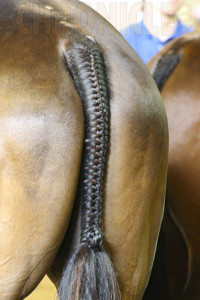You Are the Wind Beneath My… Saddle
Humorous videos on social media abound of horses bucking, running, playing, and letting out a few extra bursts of wind… The sight, and sound, is always sure to elicit a few giggles.
Two researchers took a scientific approach to determine if certain supplementation might affect a horse’s, err… methane emissions. Kanber Kara and Erol Baytok (from the Department of Animal Nutrition and Nutritional Diseases within the Faculty of Veterinary Medicine at Erciyes University) conducted a study entitled Effect of Different Levels of Psyllium Supplementation to the Horse Diet on in vitro Fermentation Parameters and Methane Emissions.
It’s long been known that laxative feedstuffs like vegetable oil, wheat bran, and flax seed meal can be used within the diet of constipated horses for preventative purposes. Psyllium fiber, in particular, has been studied for its use in the prevention of sand colic in horses. (Kentucky Equine Research, 2016).
Here’s an interesting fact: the average, adult horse produces 18 kg of methane a year, as compared to 35-55 kg produced by dairy cattle. The study’s research indicates that the rate of global methane emission of horse-derived methane emission have significantly increased over the last 10 years because of the increase in the global horse population. Furthermore, “50-60% of global methane emissions comes from agriculture and livestock (especially dairy cattle, beef, sheep) production.”
In this particular study, two Thoroughbred horses were fed 70% roughage and 30% concentrate feed, and their feces were collected for examination in the lab. Ultimately, researchers determined that the addition of psyllium to a horse’s diet decreased methane production by up to 35%! However, they determined it also had adverse effects on in vitro digestibility of the horse’s ration.
“It was considered that further investigations are necessary to understand the effects deeply, by doing the in vitro or in vivo digestion trials with lower doses, or psyllium is not suitable to use in healthy horses for a long time.”
Who knew?











